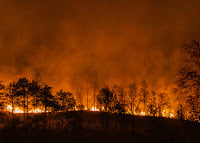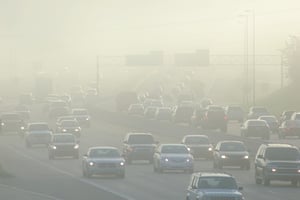Wildfire Smoke Linked to Increased Risk of Dementia

Long-term exposure to particulate matter found in wildfire smoke may raise the risk of dementia, according to a study published today in JAMA Neurology. The findings also suggest that wildfire particulate matter increases the risk more than non-wildfire particulate matter.
Holly Elser, M.D., Ph.D., of the University of Pennsylvania, and colleagues examined data from more than 1.2 million members of Kaiser Permanente Southern California. Patients were at least 60 years old and did not have dementia when they were first included in the study.
The researchers estimated the average daily concentrations of total fine particulate matter in each Southern California census tract from 2006 to 2019 using measurements from the Environmental Protection Agency Air Quality System, and then used additional federal and state meteorological data to subtract the contribution of wildfire-generated fine particulate matter from the total. The researchers then calculated three-year rolling periods of particulate exposure (updated every three months) for each patient.
During follow-up, 6.6% of patients received a diagnosis of dementia, with most of the diagnoses being for nonspecific dementia. The researchers found an 18% increase in the odds of dementia for every 1-µg/m3 increase in three-year average wildfire fine particulate matter. For non-wildfire fine particulate matter, the odds of dementia diagnosis increased by just 1% for every 1-µg/m3 increase in three-year average exposure.
In a secondary analysis, the researchers found that the associations between exposure to wildfire fine particulate matter and dementia were stronger among patients younger than 75 when they were included in the study, patients from racially minoritized subgroups, and patients living in high-poverty census tracts compared with low-poverty census tracts.
“These latter findings underscore the importance of research that considers the effects of air pollution on potentially vulnerable population subgroups and aims to identify potential strategies to mitigate inequities in air pollution exposure effects,” Elser and colleagues wrote—though they cautioned that by relying on EHR data they could not fully account for all socioeconomic or behavioral factors that may raise or mitigate the potentially damaging effects of wildfire smoke.
For related information, see the Psychiatric News Alert “Air Pollution Exposure May Be Linked to Late-Onset Depression.”
(Image: Getty Images/iStock/AndreyPopov)
Don't miss out! To learn about newly posted articles in Psychiatric News, please sign up here.





